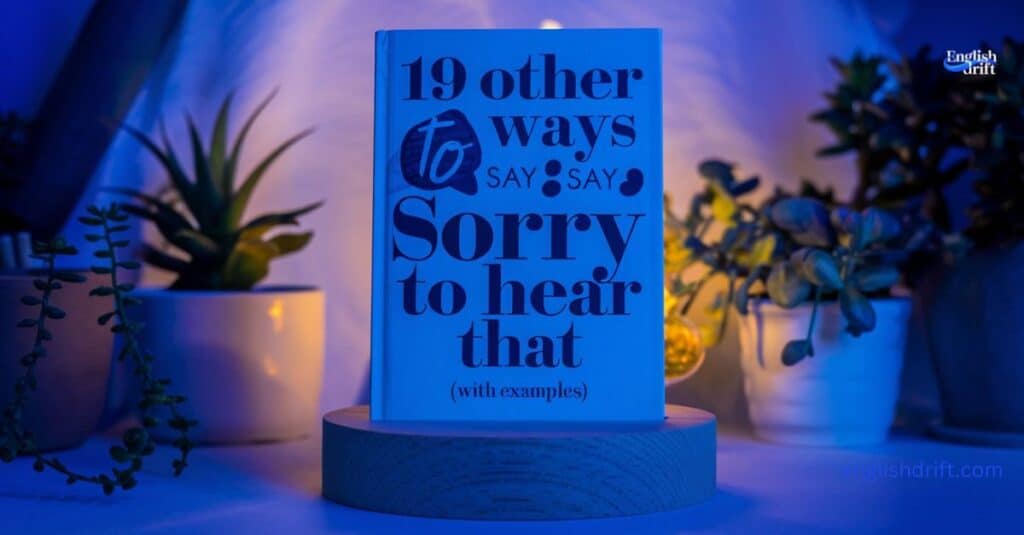In moments of grief or difficulty, finding the right words to comfort someone can be challenging. Saying “sorry to hear that” is common, but it can sometimes feel generic or impersonal. To express empathy more sorry to hear that meaning thoughtfully, there are numerous ways to convey sympathy while offering genuine support.
In this post, we’ll explore 19 other ways to say “sorry to hear that”, providing a variety of options based on different contexts. Whether you’re comforting a friend, colleague, or acquaintance, these empathy phrases can help you better express your care. Let’s dive into how you can elevate your condolence expressions with more tailored and heartfelt language.
Why It’s Important to Have Alternatives to “Sorry to Hear That”
Although “sorry to hear that” is a familiar phrase, it may not always reflect the depth of your emotions. Alternative ways to say I’m sorry allow you to express your empathy in difficult situations more authentically, especially when the occasion calls for something more personalized. Using varied phrases helps you avoid sounding rehearsed, making your message of care resonate more deeply with the person you’re supporting.
How to Choose the Right Alternative Expression Based on the Situation
Choosing the right sympathy message depends on your relationship with the person, the gravity of the situation, and the emotional tone you want to convey. For example, you might opt for a formal condolence expression in a professional setting, while a more informal phrase would be appropriate for a close friend.
READ MORE 20 Creative Ways to Say “God Bless You” (With Examples)
Factors to Consider:
- Formality – Are you speaking to a friend, family member, or colleague?
- Closeness – How close are you to the person, and how personal can you get?
- Tone – Should your message be light, somber, or uplifting?
- Support Offered – Are you in a position to provide tangible help or simply emotional support?
19 Other Ways how to Say Sorry to Hear That
- That must be incredibly hard for you
- I can’t even imagine what you’re going through
- My heart is with you
- I’m really sorry this happened to you
- I’m here for you if you need anything
- That sounds incredibly overwhelming
- I’m deeply saddened to hear that
- I wish there was something I could do to make things better
- You don’t have to go through this alone
- It’s okay to feel however you need to feel right now
- This must be incredibly difficult for you
- Please know you’re in my thoughts
- I hate that you’re going through this
- I’m so sorry this happened to you
- I wish I had the right words, but I care
- You have my deepest sympathy
- You’re in my heart and thoughts
- Take all the time you need
- I’m sending you all my love
19 Meaningful Alternatives to “Sorry to Hear That”
Below, we’ll explore 19 comforting phrases you can use instead of “sorry to hear that,” along with examples and explanations for each. Whether you’re offering empathy statements for friends or reaching out in a professional context, these phrases will help you show that you care.
1. That must be incredibly hard for you
This phrase acknowledges the difficulty of the situation without assuming you fully understand it. It validates the person’s emotions while offering empathy.
Example:
“Dealing with such a loss must be incredibly hard for you. If there’s anything I can do, please let me know.”
This works particularly well when the person is overwhelmed by personal challenges. It’s a simple, yet effective way to show you care.

2. I can’t even imagine what you’re going through
Sometimes, admitting that you don’t fully understand the depth of someone’s pain can show the most respect. This phrase is especially effective when you want to avoid making assumptions.
Example:
“I can’t imagine what you’re going through right now, but I’m here for you.”
This phrase is best used when the person is facing something unimaginable, like a sudden tragedy. It’s a consoling phrase that humbly acknowledges the uniqueness of their experience.
READ MORE How to Respond to “Hey” From a Girl Over Text: 33 Witty Responses She’ll Love
3. My heart is with you
This phrase conveys deep emotional sympathy and shows that you’re sharing their pain. It’s both personal and heartfelt.
Example:
“My heart is with you during this incredibly tough time. You’re not alone in this.”
It’s suitable for both personal and professional contexts, offering a balance between warmth and formality.
4. I’m really sorry this happened to you
Instead of a vague “sorry to hear that,” this more direct condolence expression offers empathy specific to the person’s experience.
Example:
“I’m really sorry this happened to you. I wish things could have turned out differently.”
i’m sorry to hear that
By being specific, you’re acknowledging that the event has directly affected them, making your words more genuine.
READ MORE 19 Different Ways to Say “Have a Nice Day” (With Examples)
5. I’m here for you if you need anything
Offering your presence and support can be one of the most comforting things you can do. This phrase opens the door for the person to reach out.
Example:
“I’m here for you if you need anything, even if it’s just someone to talk to.”
This is one of the best supporting phrases for friends or family going through difficult times.

6. That sounds incredibly overwhelming
When someone is juggling multiple stressors, acknowledging the difficulty they’re facing can be a huge relief.
Example:
“Handling everything you’re going through sounds incredibly overwhelming. I’m here if you need a break or just someone to listen.”
This phrase shows you understand the complexity of their situation, offering empathy without being overbearing.
READ MORE 20 Alternatives to Say “First Come First Serve” (with Examples)
7. I’m deeply saddened to hear that
For more formal situations, this empathy phrase conveys the same level of care while maintaining a respectful tone.
Example:
“I’m deeply saddened to hear about your recent loss. Please accept my heartfelt condolences.”
This works well in both personal and professional settings, offering a dignified way to express sympathy.
8. I wish there was something I could do to make things better
Sometimes, admitting that you don’t have the power to fix things can actually be more comforting than offering solutions.
Example:
“I wish there was something I could do to make this easier for you, but know that I’m thinking of you.”
It shows you’re aware of the limits of your help but still deeply care about their well-being.
9. You don’t have to go through this alone
When someone is facing a difficult time, isolation can often make things worse. This phrase reassures them that they have support.
Example:
“You don’t have to go through this alone. Lean on me whenever you need to.”
This sympathy message is perfect for close relationships where you’re in a position to provide real emotional support.
READ MORE 21 Ways to Say Good Morning Sunday Blessings
10. It’s okay to feel however you need to feel right now
Validating someone’s emotions without judgment is one of the most powerful ways to show empathy. It allows the person to process their emotions without feeling rushed or judged.
Example:
“It’s okay to feel however you need to right now. Take your time to process everything.”
This phrase can be comforting when someone is dealing with grief or an overwhelming emotional experience.

11. This must be incredibly difficult for you
A slight variation on other condolence expressions, this phrase works when the person’s situation is particularly challenging.
Example:
“I heard what happened. This must be incredibly difficult for you. If you need anything, I’m always here.”
By acknowledging the difficulty, you show that you are emotionally aware of their struggles.
12. Please know you’re in my thoughts
This is a respectful, thoughtful way to offer support from a distance. It’s particularly useful when you can’t be physically present.
Example:
“I know we haven’t spoken in a while, but please know you’re in my thoughts.”
This is a comforting phrase often used in professional or distant relationships.
13. I hate that you’re going through this
Raw and informal, this phrase expresses frustration with the situation. It’s best used with close friends or family.
Example:
“I hate that you’re going through this. It’s so unfair, but I’m here to help however I can.”
This phrase adds an emotional layer that is sometimes missing from more traditional condolence messages.
14. I’m so sorry this happened to you
Sometimes a direct apology for the situation is the best way to express your empathy.
Example:
“I’m so sorry this happened to you. You didn’t deserve this, and I’m here to support you.”
It’s a straightforward yet heartfelt way to acknowledge the person’s pain.
15. I wish I had the right words, but I care
When you don’t know exactly what to say, honesty can be the most genuine response. This phrase conveys emotional support even when words seem inadequate.
Example:
“I wish I had the right words, but please know that I care deeply about what you’re going through.”
This phrase allows you to be present without the pressure of finding the perfect empathy phrase.

16. You have my deepest sympathy
This is a formal condolence expression, ideal for situations where more casual language might not be appropriate.
Example:
“Please accept my deepest sympathy during this difficult time. You and your family are in my thoughts.”
It’s appropriate for workplace relationships or professional settings where formality is key.
17. You’re in my heart and thoughts
Another phrase that offers emotional support from afar, this one is slightly more personal than simply being “in my thoughts.”
Example:
“You may be far away, but you’re in my heart and thoughts during this tough time.”
This is a comforting phrase that bridges the gap between physical distance and emotional connection.
18. Take all the time you need
When someone is healing from an emotional or physical wound, it’s important to remind them they aren’t under pressure to “bounce back.”
Example:
“Please take all the time you need to process this. Healing is not a race, and I’ll be here when you’re ready.”
This phrase encourages the person to prioritize their recovery over societal expectations.
19. I’m sending you all my love
One of the most affectionate sympathy messages, this phrase is perfect for close friends and family.
Example:
_”I’m sending you all my love during this incredibly hard time. You mean the world to me.”_
It’s a warm, personal way to express your love and care.
Tailoring Your Response to the Person and the Situation
Crafting a personalized response is key to showing genuine empathy. Consider who you’re speaking to, the severity of their situation, and how they may prefer to receive support.
Things to Keep in Mind:
- For close friends: Use more informal, raw, and personal language.
- For colleagues: Keep it professional yet heartfelt.
- For acquaintances: Strike a balance between formality and compassion.
Quick Reference Table for Choosing the Right Phrase
| Situation | Phrase Option | Tone |
|---|---|---|
| Close friend grieving | “I hate that you’re going through this.” | Informal, empathetic |
| Colleague lost a loved one | “Please accept my deepest sympathy.” | Formal, respectful |
| Distant acquaintance | “You’re in my thoughts.” | Neutral, polite |
Phrases to Avoid When Offering Sympathy
While it’s important to express sympathy, some phrases can come across as dismissive or unhelpful, even when well-intended. Here’s what to avoid:
- “Everything happens for a reason” – This can minimize their experience.
- “I know how you feel” – Everyone’s experience is unique, and claiming to know their pain can come off as dismissive.
- “At least…” – Starting a sentence with “at least” suggests you’re downplaying the situation.
By avoiding these phrases, you ensure your words are comforting rather than inadvertently hurtful.
Final Thoughts: The Power of Empathy in Words
When someone is facing a difficult situation, your words can be a powerful tool in offering comfort. Using thoughtful, personalized sympathy messages can make a big difference in how supported they feel. Whether it’s a simple, heartfelt statement or a more formal message, offering empathy in difficult situations shows that you genuinely care.
Remember, the key is not just what you say, but how you say it. Whether you’re offering emotional support in person, through text, or in writing, these sorry to hear that alternatives will help you express empathy and support in the most meaningful way possible.

Henry James is an experienced blogger at English Drift, specializing in English grammar and vocabulary. With a passion for language and clear communication, Henry helps readers enhance their writing skills through insightful guides and practical tips.







